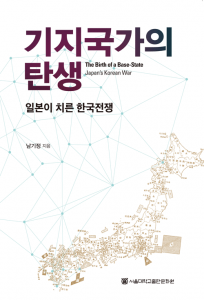2017 ICAS Book Prize in Korean : Book Talk Series 2

- Date & Time: Thursday, 2 November, 15:00-17:00
- Venue: Yang Doo Suk Hall(3F, Kwanjeong), SNU Library
- Organizers: SNU Library, SNU Asia Center
- Inquiry: Nahyun Lee / +82-2-880-2868 / julianalee@snu.ac.kr
About
 Shortlisted for IBP 2017 Korean Language Edition
Shortlisted for IBP 2017 Korean Language Edition
[The Birth of a Base-State: Japan’s Korean War], Kijeong Nam, Seoul National University Press, 2016.
Author : Kijeong Nam
● HK Professor, SNU Institute for Japanese Studies
● Recent Research Achievements
-『The Structural Transformation and Conservatism of Japanese Politics』(Ed., 2017)
-『Postwar Japan’s Everyday-life Pacifism』(Ed., 2014)
-『Similar Conditions, Different Paths?: Japan’s Normalization of Relations with Korea and Vietnam』(2015)
-『The Reality of Military Base State and the Evolution of Pacifism: Japan’s Korean War and Peace』 (2014)
This book traces the transformation of Japan into a “base-state” of the United States, which started with Japan’s engagement in the Korean War after the defeat in the Second World War. On the basis of the historical review, the author further interprets the present and future of Japan as it attempts to restore its military sovereign rights. Existing literatures indicate the US foreign policy in Asia—and more specifically the US demand for the right of collective self-defense at the San Francisco Treaty (1951)—as the origin of Japan’s transition issue into a normal state. But the author finds the origins of the issue in the Korean War and the following armistice regime in East Asia, which coincided with Japan’s interests in army control during the postwar period. This study examines the uniqueness of the Japanese state in the postwar period and explains Japan’s behavior from the fresh angle of the “base state” concept in an East Asian context. It invites us to rethink about a typical state theory, “war makes a state”. The author reveals that the security and international relations among the US, South Korea, and Japan were formed through the Korean War, and looks at this alliance-building in the context of the Cold War, which had a complex structure of competition, cooperation, and conflict against USSR-North Korea-PRC connections. This study is also an exemplary demonstration of how to overcome the limits of single-country or specific regional study through the use of a broader perspective like a regional paradigm or a transnational East Asian angle.
